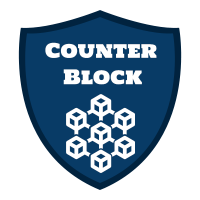Project objective is the creation of a Blockchain system that tackles counterfeiting in the supply chain of spirits and wines. The system consists of a single Blockchain-based platform that offers product traceability, according to the internationally recognized standards GS1 EPCIS (Electronic Product Code Information Services), as well as secure data management and data sharing. The system focuses on categories of products that people consume and are most often counterfeited, such as food and beverages as they contain financial losses but also particularly serious health risks. The basic solution to the counterfeiting problem, introduced by Blockchain technology, is to redesign the supply chain traceability.
The decentralized database, offered by Blockchain technology, can store any transaction or action performed within the supply chain, thus offering increased detection and security. Each transaction along the supply chain contributes by providing data to a decentralized and secure network that can prove the origin of the product, track who it belongs to, and provide authentication. All this data allows the detection of any information related to the product in the supply chain, thus ensuring its transparency and effective protection against counterfeiting of the product.

The Blockchain system has several advanced features aimed at tackling counterfeiting of products in the supply chain:
Traceability: The Blockchain system is based on a standardized approach that will be globally accepted, effective and serves the interoperability between the actors involved in the supply chain. For this purpose, the international and widespread GS1 standards for the supply chain were used, which are the basis of a common commercial language and procedures by all those involved in the supply chain. The international GS1 standards for the supply chain include, among others, standards for the identification of (i) location (ii) products, (iii) data collection and (iv) interconnection of electronic communications, which will allow the unimpeded flow of information for each product in the supply chain. This supports traceability and interoperability worldwide with accurate and quality information.
Effective traceability in the supply chain is based on all stakeholders who collect, record and share relevant information about their products and property. For the effective design of the Blockchain traceability system, all the points of the supply chain (producer, processor, carrier, wholesaler, etc.) and the produced products are identified. Based on the GS1 standards, each position in the chain is assigned a globally unique position number GLN (Global Location Number) and for each product, respectively, the unique code number GTIN (Global Trade Item Number). Corresponding codes are used for all levels of product packaging (e.g. SSCC pallets - Serial Shipping Container Code). For the uniqueness of each product within the chain, product marking technologies are used with linear or two-dimensional pixels (GS1 barcode, GS1 Datamatrix) which contain the GTIN code and additional product information, such as batch number, serial number, data property etc.
The next stage after the identification of the positions and the products includes the recording of the critical events of transport or processing of the product in the supply chain. For this purpose, the GS1 EPCIS (Electronic Product Code Information Services) standards are utilized for the development of the Blockchain system, which allow the detailed recording of events along the supply chain. The Blockchain system through the GS1 EPCIS standards allows dissimilar and separate applications and processes (as usually happens from business to business) to create and report events both internally to businesses (within departments) and with their partners.
Decentralization and Increased Security: The first research results of decentralization efforts, such as the Simple Public Key Infrastructure (SPKI), were developed in the late 1990s but were not implemented in practice. However, with the success of BitCoin and Ethereum, decentralized solutions have now become widely accepted, with a rapid increase in interest in recent years. In this new situation, the system achieves true decentralization and implements security solutions that do not require a "trust root", utilizing Blockchain technology. This is not just a theoretical advantage, but a key asset that increases trust and allows the system to be quickly adopted by numerous companies.
Privacy Protection: To ensure data privacy, and of course compliance with the GDPR, the system adopts a different level approach to data storage. First, there is a private database on the traceability platform managed by each stakeholder. In addition, there is a decentralized database in Blockchain that will contain data that is shared between the cooperating entities (e.g. producers, resellers or even retailers in case of use of food or beverage supply chain) but also data on transactions and verification of the authenticity of the product. Thus, the system guarantees the originality of an item, keeping personal data safe and without any compromise on privacy. In this way, the products can be inspected at any time without making available to third parties’ information that the manufacturer does not wish to leak (e.g. product or product recommendation information).
The implementing bodies of the project are the following:
- Industrial Engineering Laboratory (IEL) of the School of Mechanical Engineering (https://www.ielab.mech.ntua.gr) is an officially institutionalized laboratory of the National Technical University of Athens (NTUA) and is active in while at the same time it is the core of solving many problems of organization, production management and business software in Greek industrial enterprises. The laboratory conducts the research activity of the project, organizes numerous dissemination and publicity activities, and coordinates the implementation of the project.
- OPTIMUM SA (https://www.optimum.gr/el/) is active in the field of Supply Chain Management Information Systems. OPTIMUM's continuous development is characterized by an investment orientation in new markets and new technologies. The company is actively involved in blockchain technology, already participating in two relevant European Research projects (NRG5 and SOFIE) and aims to establish itself in the market by offering advanced blockchain systems solutions to support Logistics. The company has undertaken the design and implementation of the Blockchain system.
- GS1 Association - Greece (https://www.gs1greece.org/) is a non-profit organization, member of the international GS1 Organization, legal and the only authorized body in Greece for the issuance and management of GS1 barcodes (prefixes 520 and 521), GS1 EPCIS standards and various other standards widely used in the supply chain. GS1 offers the necessary know-how as well as the internationally recognized standards that it has developed and undertaken the design of traceability processes as well as the definition of the specifications of the blockchain system. It also cooperates with a production company and the company Synergy-Logistics, through subcontracting, for the control and pilot implementation of the system. Finally, it contributes to the planning of the commercial exploitation of the project (Business plan) as well as to its active promotion, utilizing the know-how and experience of the executives but also the wide circle of companies with which it collaborates.
- CENTIVA SOFTWARE SOLUTIONS (https://www.centiva.gr/) is a computer company that provides a wide range of services and business solutions, harmonized with the requirements of modern companies. Develops custom business applications for various sectors, such as e-commerce and the supply chain. The company contributes to the design and development of the system regarding the functionality of traceability and the collection of data from the course of the product in the supply chain. It also ensures system compliance with GS1 EPCIS traceability standards. Finally, the company participates in the control of proper operation, in the construction of the project website as well as in the design of the commercial exploitation plan (Business plan) and the promotion of the project since it has great experience in digital marketing.


